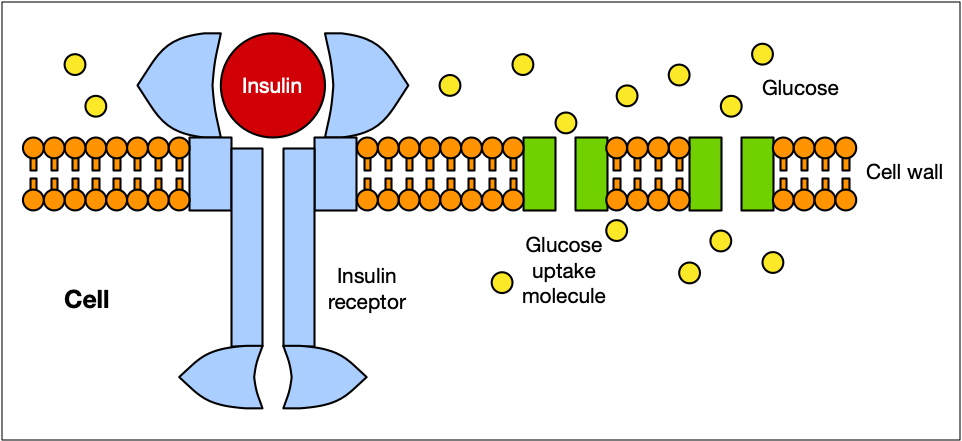About Insulin Resistance
Any carbohydrate or sugar eaten is digested and broken down into glucose which is absorbed into the bloodstream. The glucose is then taken up by cells and used for metabolism or converted into glycogen or fat which is stored.
The movement of glucose from the bloodstream into cells occurs through uptake molecules in the cell wall. The number of these uptake molecules, and therefore the amount of glucose taken in by cells, is regulated by the hormone insulin. Insulin binds to a receptor in the cell wall which cause an increase in the number of glucose uptake molecules available to transport glucose from the blood into the cell.

This is a good Youtube video explaining the process in detail: https://www.youtube.com/watch?v=MGMdKvZti1U
With insulin resistance, the sensitivity of the receptor to binding with insulin is reduced, so fewer glucose uptake molecules are activated in response to insulin secretion. The body responds by producing more insulin, and the cells produce greater numbers of receptors in an effort to remove excess glucose from the blood.
While high levels of glucose in the blood does damage cells, the resulting increase in insulin circulating in the blood also causes or contributes to most of the problems associated with Type 2 diabetes. Insulin resistance is usually present for some years before any diagnosis of Type 2 or gestational diabetes is made. Insulin is unique as a hormone in that it affects all types of cells in the body. While fat and muscle cells commonly become insulin resistant, not all cell types do, so these cells are overstimulated by the excess circulating insulin, often producing garmful molecules leading to cell damage. Reducing insulin levels is critical to the treatment of Type 2 diabetes.
Further Reading:
Introduction to Insulin Resistance,
Useful patient booklet produced by the Society of Metabolic Health Practitioners.
"Insulin resistance is the underlying cause of nearly all metabolic disease. This handout reviews the causes, diagnosis and treatment of insulin resistance."
Click link on this page:
https://thesmhp.org/resources/patient-resources/patient-handouts/
Diabetes.co.uk
https://www.diabetes.co.uk/insulin-resistance.html
U.S. Department of Health and Human Services National Institute of Diabetes and Digestive and Kidney Diseases
https://www.niddk.nih.gov/health-information/diabetes/overview/what-is-diabetes/prediabetes-insulin-resistance
Centres for Disease Control (CDC)
https://www.cdc.gov/diabetes/about/insulin-resistance-type-2-diabetes.html
myDr
https://mydr.com.au/diabetes/insulin-how-it-works/
Contact me

 What is a Low Carb Diet
What is a Low Carb Diet